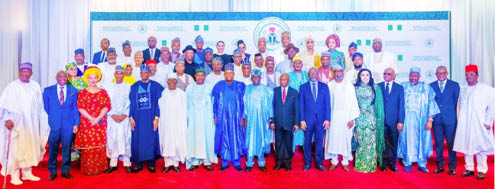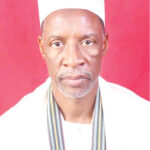President Bola Ahmed Tinubu on Monday inaugurated his 45-man Federal Executive Council, nearly three months after he took over the leadership of Nigeria. Made up of contemporary politicians, a sprinkle of seasoned technocrats, and a number of youthful people, the ministers face the challenge of restoring the faith of the Nigerian public in governance, a phrase that was very apt and stood out in Tinubu’s speech during the inauguration.
While congratulating the new ministers, the president gave this solemn admonition: “Your highest obligation is to restore public faith in government so that our people can once again believe that government can be a positive force for transformation and a vehicle for collective progress of all citizens of this great country”.
The new cabinet has generated riotous debate, first about its size, with the highest number of ministers since the beginning of the current political dispensation in 1999; then to the credentials and integrity of some politicians who made the list. However, it is glaring that critical and strategic thinking went into the creation of new ministries and the rejigging of several others. From their titles, it is clear that the Tinubu administration is set to develop some previously redundant sectors in the Nigerian economy and add impetus to the activities of others.
For instance, the Ministry of Finance and Coordinating Economy may be a strategy to harmonize the monetary and fiscal policies of government, as opposed to the past, when monetary measures did not clearly align with government fiscal strategies. The error created tension and made the Central Bank of Nigeria Governor, Godwin Emefiele, and the Minister of Finance, Budget and Planning, Zainab Ahmed, to sometime work at cross-purposes.
Job racketeering: Reps re-summon absentee MDAs
NASFAT president tasks new ministers on performance
Also, the Ministry of Marine and Blue Economy, which deals with all economic activities in oceans, seas, and coasts, may give new impetus to the maritime sector, whose potential has not been harnessed over the years. Rather, it has been the cash cow, and a source of anger and bitterness between the powers that control the Ministry of Transportation, the Nigerian Maritime Administration and Safety Agency (NIMASA), the Nigeria Customs Service (NCS), and various companies that operate as concessionaires in the sector.
The Marine and Blue Economy, if allowed to thrive, would boost sectors related to fisheries, tourism, and maritime transport, as well as emerging activities, such as offshore renewable energy, aquaculture and seabed extractive activities.
The Ministry of Tourism, standing alone, not as an appendage to culture, is quite an ambitious move to develop the tourism potential in Nigeria. So also is the fact that steel development now has a minister, at a time when most steel factories and plants in the country are comatose, as symbolized by the frustration and abandonment of the gigantic Ajaokuta Steel Complex in Kogi State. If given the necessary support and motivation, the ministers of Tourism and Steel Development could open up a new frontier in the development sectors.
However, the Ministry of Water Resources and Sanitation may actually sound a bit odd, as sanitation collocates more with the environment than water resources. Over the years, experts have argued that more attention should have been given to Forestry, as the nature of the growing insecurity in Nigeria is linked to the abandonment of the country’s forests. Also, the government has left out rural development, as we now have the Ministry of Agriculture and Food Security, a clear tautology, as inherent in the sense of agriculture is food security. It is not clear why rural development is missing from the list. Also, livestock farming, which received a lot of attention during the Buhari administration, seems to have been relegated, in spite the campaign for the sector to be modernized in order to reduce incessant farmer-herder conflict.
There are other odd nomenclatures, like the Ministry of Health and Social Welfare, and the recurrence of innovation in the Ministry of Communications, Innovation, and Digital Economy; the Ministry of Innovation, Science, and Technology, and the Ministry of Art, Culture, and the Creative Economy. It is appropriate for the government to clearly identify the distinctive features of the innovations and creativity as they apply to the separate ministries.
It is good to draw the attention of the president and his ministers to the fact that the task ahead goes beyond generating great ideas about a great future. These ideas must be implemented with commitment and sincerity of purpose; otherwise, at the end of the four-year tenure, the Tinubu government would join the long row of governments that came up with very promising ideas but ended up being so devastatingly disappointing. This government must hit the ground running, as four years is not forever; it is such a short space of time that will pass like a fleeting moment.
This government must depart from the past, where the laissez-faire attitude of presidents gave ministers the liberty to work at their own pace and pleasure, and achieve little or end in disaster. To avoid such a situation, Tinubu must walk his talk. He told the ministers that he would hold them accountable for their actions. The president said, “I expect that you will serve with integrity, dignity, and deliver. I will hold you to that standard we all promised Nigerians.” The president must constantly review the quality and quantity of services that his ministers render, and this cannot be achieved if the government ignores the need to generate Key Performance Indicators (KPIs) for each senior and junior minister. If there are no parameters to measure the performance of these ministers, most of them will end up enjoying the glory and comfort of being ministers while they beat about the bush without direction. In addition to holding the ministers accountable, we call on the president to ensure that any allegation of corruption against any of his ministers is not swept under the carpet. It must be thoroughly and dispassionately investigated to ensure they do not frustrate the objectives of this government.
This newspaper will not fail to draw the attention of the president and his ministers to the fact that the country is at a very delicate crossroads, between becoming a failed state and economic revival. The removal of subsidy on Premium Motor Spirit (PMS), collapse of the foreign exchange windows, inflation, unemployment, low industrial production, poverty, and the general lack of social infrastructure have put Nigerians under tremendous pressure. Insecurity is at the intersection of the current socio-economic problems facing the country. The Tinubu administration must come up with a pragmatic approach to end terrorism, banditry and ethnic conflicts in order to free the space for agriculture to thrive and for investment in industries to expand.
This government cannot but come up with ingenious approaches to tackling these existential challenges. The slogan of this government is ‘the Administration of Renewed Hope,” meaning that government would embark on bold measures that will pull the people out of frustration and disillusionment. It is not an easy task. Contemporary human history has taught the world that no nation can achieve socio-economic development by chance. In like manner, Nigeria cannot emerge from the woods by wishful thinking. The Tinubu government has accepted the challenge to reverse the downward slide of the economy; it must not fail to record success. His ministers must be put to task in order to meet the mark.

 Join Daily Trust WhatsApp Community For Quick Access To News and Happenings Around You.
Join Daily Trust WhatsApp Community For Quick Access To News and Happenings Around You.


